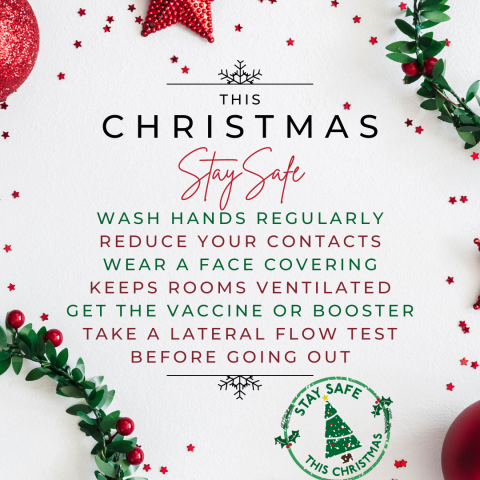Public urged to get ‘back to basics’ to reduce Christmas risk

The Public Health Agency (PHA) is urging people to remember the basic steps to help reduce their risk of catching or spreading COVID-19 ahead of the festive period – wear a face covering, maintain social distancing, and practise good hand hygiene – as well as keeping rooms well-ventilated and getting the COVID-19 vaccine or booster if you are eligible.
Dr Brid Farrell, Deputy Director of Public Health at the PHA, said: “December and the festive period are traditionally times when we meet up with others and spend extended time with them, and understandably many people will want to catch up over Christmas and the New Year. However, we don’t want what ought to be a positive experience to become negative through the spread of coronavirus.
“The core advice around what we can do to reduce our risk has been in place since the start of the pandemic, but with restrictions having eased over the past few months many may inadvertently let their guard down. However, COVID-19 remains a threat and these steps will be the most effective way of helping to protect ourselves and those around us in the lead up to and over Christmas by reducing the risk of spread of all strains of the virus.
“Testing will play an important part in limiting the spread of COVID-19. In the coming weeks we’d ask that you limit your contacts, but if you are going to be around a greater number of people in whatever you’re doing, take a lateral flow test (LFT) before you go to any event or social gathering. The test is easy, quick and can be done at home. Your LFT result is ready in 30 minutes. If it’s positive, don’t go out, self-isolate and book a PCR test.
“Getting the test packs is easy too. You can collect them at selected community pharmacies or order them online for free direct to your home. Importantly, taking the test, or a negative result from the test, doesn’t mean you can ignore the other important public health requirements.
“Given the evidence of community transmission of Omicron elsewhere in the Common Travel Area, it is also advised that those without symptoms take a LFD test before travelling to Northern Ireland from England, Scotland, Wales or the Republic of Ireland.
“Wear a face covering indoors where social distancing isn’t possible, or where it’s required, such as in shops, shopping centres, taxis, and public transport.
“Everyone should wear their face covering properly– make sure both your nose and mouth are covered, and it fits snugly. Also, avoid touching or adjusting your face covering unless your hands are clean, as you risk transferring the virus from your hands to your face.
“You should also maintain a safe distance between you and anyone outside of your household, to minimise your exposure to the virus and reduce the potential of spreading the infection.
“It is also important to wash your hands properly and try to avoid touching your face. Wash your hands as soon as you get home. If you sneeze or cough, ‘catch it, bin it, kill it.’
“Additionally, if you are indoors, keep rooms well-ventilated – evidence suggests that the virus is less likely to be passed on in well-ventilated rooms. Meet outside whenever possible.
“Vaccination is an important means of securing protection against COVID-19 infection. We would appeal to everyone to get vaccinated if they fall into one of the groups who can get it, and get the booster if you are eligible. The benefits of vaccination are clear. It helps protect you and those close to you.”
Dr Farrell added: “It is important not to become complacent about COVID-19. We need to remain vigilant and continue to exercise caution. Don’t take unnecessary risks, and take every step available to help protect yourself, your loved ones and the community. If you have symptoms of COVID-19 – a high temperature; OR a new, continuous cough; OR a loss of or change in sense of smell or taste, no matter how mild – please isolate and get a PCR test. Testing is available at various locations across Northern Ireland. We are asking everyone to familiarise themselves with the guidance for positive cases and save the Contact Tracing Service number – (028) 9536 8888 – to their phone so they know who it is trying to call them and please answer when we do call.
In addition, guidance on travel from red list countries can be found at www.nidirect.gov.uk/articles/coronavirus-covid-19-travelling-northern-ireland-red-list-country
Details on PCR testing for those who have the symptoms of COVID-19 can be found at www.pha.site/cvtesting
For more information see www.pha.site/coronavirus
